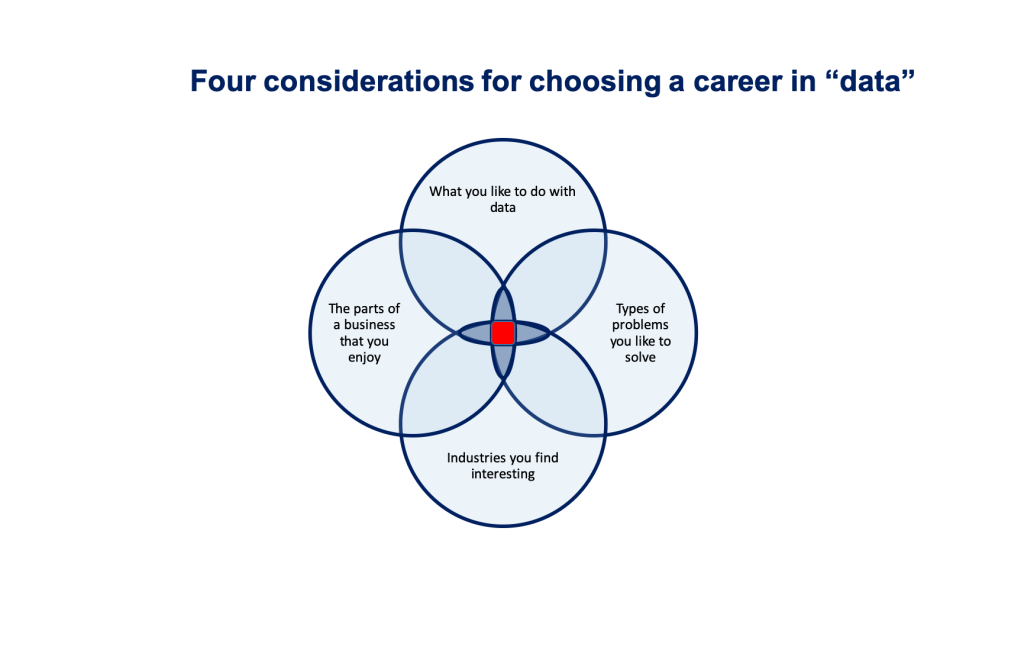
Mr. McGuire: I just want to say one word to you. Just one word.
Benjamin: Yes, sir.
Mr. McGuire: Are you listening?
Benjamin: Yes, I am.
Mr. McGuire: Plastics[1]
That conversation from the 1967 film The Graduate is one of the most famous pieces of career advice in pop-culture.
Of course, if the movie were released today, that conversation would be slightly different:
Mr. McGuire: I just want to say one word to you. Just one word.
Benjamin: Yes, sir.
Mr. McGuire: Are you listening?
Benjamin: Yes, I am.
Mr. McGuire: Data
Data and analytics are currently the “hot thing”. Actually they’ve been so for a while.
However, unlike with “Plastics”, “Data” means a lot of things to a lot people.
I often have an opportunity to speak to students who are thinking about careers in “data”. My first question is always, “What does that mean to you?”. More often than not, they really don’t know. They just know that they should be doing it, whatever “it” happens to be.
Careers in data and analytics are more than just about using tools and technology with data and information. What makes a career interesting is the context in which you use those tools and technology.
Here are the four questions/considerations that help you think through where you might have the most enjoyable career in data and analytics.
None of these are meant to be exhaustive or discrete. There is a lot of overlap across different ways of working with data.
My goal isn’t to create a robust all-encompassing model. This is just an attempt to provide some structure for thinking about the field.
All of these areas will use your basic understanding of data and analytics and their fundamental tools and technologies. However, different permutations across these four areas will have their own unique tools, models, and frameworks. Each combination can provide a very different career in data and analytics.
What do you like to do with data?
- Reporting – finding ways to help people quickly and easily understand what the data are telling them.
- Analyzing – finding connections and patterns to understand what is happening now (or in the past).
- Predicting – finding connections, patterns, and models to understand what is likely to happen in the future.
What types of problems do you like to solve?
- Process problems – looking at how information, money, materials, and services flow through an organization (and where they get stuck).
- Financial problems – looking at money and capital and whether it’s being used efficiently and effectively.
- People problems – understanding what makes people (employees, leaders, customers, the public) “tick”, how to engage or interest them, and how they make decisions.
What types of industries/business do you like?
- Services – Financial, insurance, hospitality (restaurants, hotels, amusement parks, theaters), Social media companies
- Products – Consumer products, industrial products, high tech products
- Healthcare – Hospitals, health systems
- Government – Federal, local, social services
- Education – Schools, Education Consulting, Testing and Assessment, Administration
- Non-profit
What areas of business do you like?
- Accounting/finance
- Sales/marketing/advertising
- Talent/workforce management
- Manufacturing
- IT/Technology
- Operations/Quality
- Legal/Compliance
The interesting thing about these questions is that only the first one has to do with data. The rest have to do with the context in which you use data. Therefore, the model is actually helpful thinking through any career. You just have to replace the first section with a breakdown of the functional or technical discipline you are considering.
Data and analytics are tools. Like any tools, they are only interesting if they are being used in a context that you enjoy.
——————
Brad Kolar is an Executive Consultant, Speaker, and Author with Avail Advisors. Avail helps leaders simplify their problems, decisions, data, and communication. Contact Brad at brad.kolar@availadvisors.com.
[1] Nichols, Mike, director. The Graduate. 1967.

